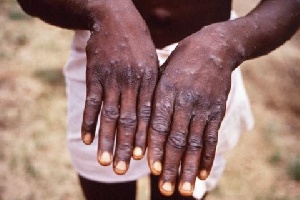 Symptoms of mpox include fever, aches and skin lesions
Symptoms of mpox include fever, aches and skin lesions
South Africa has reported a second death from the Mpox outbreak.
Officials on Wednesday indicated the viral disease has spread mainly among men even though officials say they are widening the net to contact people who had associated with the victims.
The latest victim is a 38-year-old male patient who was admitted to a hospital in KwaZulu-Natal (KZN) province. He died on the same day his test results confirmed an Mpox infection.
South Africa had reported the first death of a 37-year-old man on Monday in a hospital in Gauteng province, just three days after admission, according to Health Minister Joe Phaahla.
The country has announced that there have been six confirmed cases of Mpox overall, according to the National Health Department of SA.
Mr Phaahla, expressed concern over the Mpox outbreak, revealing that all six cases identified this year were severe and required hospitalisation.
These cases involved men between 30 and 39 years old, with none having had recent travel history to countries experiencing outbreaks, signaling that the outbreak could be local.
One confirmed case reported having sexual encounters with multiple partners of different genders in recent weeks, the official said. This raises the possibility that females may also be infected, prompting a wider contact tracing net.
Mpox, previously known as Monkeypox, is a viral disease spread through close contact. It typically begins with flu-like symptoms such as fever, headache, muscle aches, and back pain, followed by the development of a rash.
The World Health Organisation (WHO) declared a public health emergency due to a significant Mpox outbreak in 2022. While the emergency phase ended last year, some countries, including South Africa, are still experiencing new cases. Others like the Democratic Republic of Congo too have reported recent cases.
“One death is too many, especially from a preventable and manageable disease," said the South African health minister.
“Its presentation is in the form of skin lesions or eruptions on the skin. “Those who have had chicken pox will know that chicken pox also presents as a skin eruption. For the fact that this is a disease that can be treated, anybody with suspicions or doubts should rather go to the nearest health facility so that it can be tested."
The health minister revealed that all six identified Mpox patients since May suffered from underlying immunodeficiencies. However, two individuals have recovered and returned home, while two others are still admitted. One patient has been discharged, another is in home isolation and follow-ups are being made. Two cases are still admitted to the hospital.
“The cases have co-morbidities and have been identified as key populations, men who have sex with men (MSM). Thus, the department is reaching out to organisations working on HIV programmes and with key populations in addition to other stakeholders to implement targeted communication to intensify awareness about the outbreak and local transmission of the disease.”
As a precautionary measure, anyone who had contact with the deceased patient will be monitored for 21 days, the standard incubation period for Mpox. In a statement, the SA health minister explained that the disease is also “caused by the monkeypox virus (MPXV), an orthopoxvirus that transmits from person to person through close contact, and from unknown animal reservoirs in East, Central, and West Africa.
This multi-country Mpox outbreak is characterised by sustained human-to-human transmission via direct skin-to-skin and sexual contact; people living with HIV are disproportionately affected.
“South Africa is amongst the countries currently experiencing the outbreak of Mpox, a viral infection which spreads between people and occasionally from the environment to people via objects and surfaces that have been touched by a person with Mpox.”